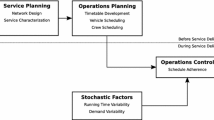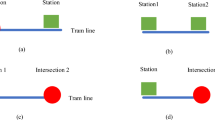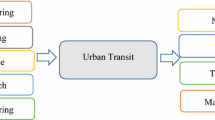Abstract
In public transit planning, regularity of timetables is seen as an important means to improve capacity efficiency by assuring an even trip distribution, as well as to improve product attractiveness and appreciation. This paper focuses on examining whether a regular timetable can also help to reduce network delay, especially resulting from inevitable small disturbances. Following the formulation of a mathematical optimization approach, we propose a number of conditions a network has to fulfill for timetable regularity to have a delay reducing impact. A set of three network properties is identified, which consists of (a) the sharing of resources between tram lines, (b) a low variability of driving times, and (c) the non-redundancy of the network’s central resources. To test the impact of these properties, a series of optimization and simulation experiments is conducted on models of the tram network of the cities of Cologne, Germany, and Montpellier, France. Small disturbances are introduced to the simulated operations to check whether the presence of all three properties is necessary for a network to benefit from a regular timetable. The results show that while with all properties present a regular timetable can indeed help to reduce delays resulting from small disturbances, the non-compliance with any one of the conditions nullifies the impact of regularity on the result.














Similar content being viewed by others
Explore related subjects
Discover the latest articles, news and stories from top researchers in related subjects.References
Bampas E, Kaouri G, Lampis M, Pagourtzis A (2006) Periodic metro scheduling. In: Proceedings of ATMOS
Banks J, Carson JS, Nelson BL, Nicol DM (2010) Discrete-event system simulation. Pearson
Cacchiani V, Caprara A, Fischetti M (2012) A Lagrangian heuristic for robustness, with an application to train timetabling. Transp Sci 46(1):124–133
Caimi G, Fuchsberger M, Laumanns M, Schüpbach K (2010) Periodic railway timetabling with event flexibility. Networks 57(1):3–18
Ceder A, Golany B, Tal O (2001) Creating bus timetables with maximal synchronization. Transp Res Part A Policy Pract 35:913–928
Dakin RJ (1965) A tree-search algorithm for mixed integer programming problems. Comput J 8:250–255
Desaulniers G, Hackman M (2007) Public transit. In: Barnhart C, Laporte G (eds) Handbooks in operations research and management science, vol 14. Elsevier, Amsterdam, pp 69–127
Dréo J, Pétrowski A, Siarry P, Taillard E (2006) Metaheuristics for hard optimization. Springer, Berlin
Eanki A (2004) A model to create bus timetables to attain maximum synchronization considering waiting times at transfer stops. Master thesis, University of South Florida
Genç Z (2003) Ein neuer Ansatz zur Fahrplanoptimierung im ÖPNV: Maximierung von zeitlichen Sicherheitabständen. Dissertation, Mathematisch-Naturwissenschaftliche Fakultät, Universität zu Köln
Ibarra-Rojas O, Rios-Solis Y (2012) Synchronization of bus timetabling. Transp Res Part B Methodol 46(5):599–614
Kölner Verkehrsbetriebe AG (2012) Deutsche Bahn AG, VRS GmbH (Hrsg.): Bahnen in Köln 2012. Netzplan
Lückerath D, Ullrich O, Speckenmeyer E (2012) Modeling time table based tram traffic. Simul Notes Eur 22(2):61–68
Lückerath D, Ullrich O, Speckenmeyer E (2013) Applicability of rescheduling strategies in tram networks. In: Reichardt R (ed) Proceedings of ASIM-Treffen STS/GMMS 2013, ARGESIM Report 41, ASIM-Mitteilung AM 145, ARGESIM/ASIM Pub., TU Vienna/Austria
Saharidis G, Dimitropoulos C, Skordilis E (2014) Minimizing waiting times at transitional nodes for public bus transportation in Greece. Oper Res Int J 14(3):341–359
Transports de l’agglomération de Montpellier (2013) Un réseau en étoile. http://www.montpellier-agglo.com/tam/page.php?id_rubrique=31 (Accessed 21 Feb 2013)
Turnquist MA, Bowman LA (1980) The effects of network structure on reliability of transit service. Transp Res Part B Methodol 14(1–2):79–86
Ullrich O, Lückerath D, Franz S, Speckenmeyer E (2012) Simulation and optimization of Cologne’s tram schedule. Simul Notes Eur 22(2):69–76
Ullrich O, Lückerath D, Speckenmeyer E (2015) A robust schedule for Montpellier’s Tramway network. Simul Notes Eur 25(1):1–8
Van Ort N, van Nes R (2009) Regularity analysis for optimizing urban transit network design. Public Transp 1(2):155–168
Vince A (1989) Scheduling periodic events. Discrete Appl Math 25:299–310
Vossloh Kiepe GmbH (2003) Elektrische Ausrüstung des Niederflur-Stadtbahnwagens K4000 der Kölner Verkehrs-Betriebe AG. Druckschrift 00KV7DE
Wu Y, Tang J, Yu Y, Pan Z (2015) A stochastic optimization model for transit network timetable design to mitigate the randomness of traveling time by adding slack time. Transp Res Part C Emerg Technol 52:15–31
Acknowledgments
This material is based in part upon work supported by the National Science Foundation under Grant Nos. I/UCRC IIP-1338922, AIR IIP-1237818, SBIR IIP-1330943, III-Large IIS-1213026, MRI CNS-0821345, MRI CNS-1126619, CREST HRD-0833093, I/UCRC IIP-0829576, MRI CNS-0959985, FRP IIP-1230661, and US Department Transportation under a TIGER grant.
Author information
Authors and Affiliations
Corresponding author
Rights and permissions
About this article
Cite this article
Ullrich, O., Lückerath, D. & Speckenmeyer, E. Do regular timetables help to reduce delays in tram networks? It depends!. Public Transp 8, 39–56 (2016). https://doi.org/10.1007/s12469-015-0115-6
Published:
Issue Date:
DOI: https://doi.org/10.1007/s12469-015-0115-6




